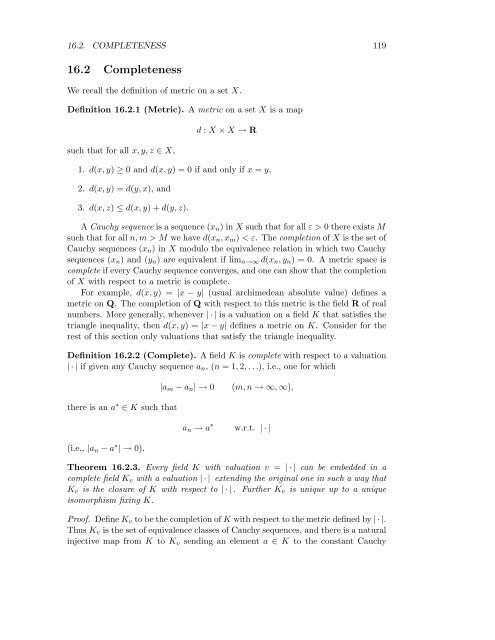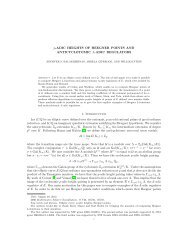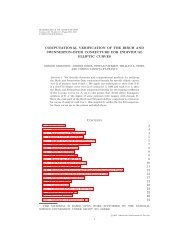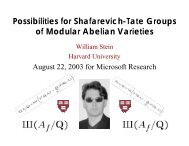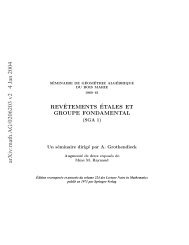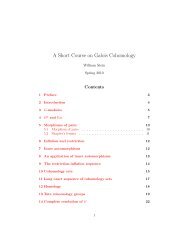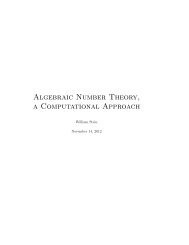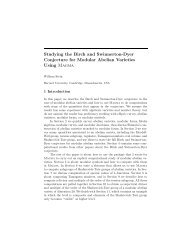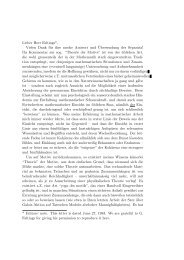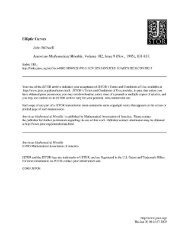A Brief Introduction to Classical and Adelic Algebraic ... - William Stein
A Brief Introduction to Classical and Adelic Algebraic ... - William Stein
A Brief Introduction to Classical and Adelic Algebraic ... - William Stein
Create successful ePaper yourself
Turn your PDF publications into a flip-book with our unique Google optimized e-Paper software.
16.2. COMPLETENESS 119<br />
16.2 Completeness<br />
We recall the definition of metric on a set X.<br />
Definition 16.2.1 (Metric). A metric on a set X is a map<br />
such that for all x, y, z ∈ X,<br />
d : X × X → R<br />
1. d(x, y) ≥ 0 <strong>and</strong> d(x, y) = 0 if <strong>and</strong> only if x = y,<br />
2. d(x, y) = d(y, x), <strong>and</strong><br />
3. d(x, z) ≤ d(x, y) + d(y, z).<br />
A Cauchy sequence is a sequence (xn) in X such that for all ε > 0 there exists M<br />
such that for all n, m > M we have d(xn, xm) < ε. The completion of X is the set of<br />
Cauchy sequences (xn) in X modulo the equivalence relation in which two Cauchy<br />
sequences (xn) <strong>and</strong> (yn) are equivalent if limn→∞ d(xn, yn) = 0. A metric space is<br />
complete if every Cauchy sequence converges, <strong>and</strong> one can show that the completion<br />
of X with respect <strong>to</strong> a metric is complete.<br />
For example, d(x, y) = |x − y| (usual archimedean absolute value) defines a<br />
metric on Q. The completion of Q with respect <strong>to</strong> this metric is the field R of real<br />
numbers. More generally, whenever | · | is a valuation on a field K that satisfies the<br />
triangle inequality, then d(x, y) = |x − y| defines a metric on K. Consider for the<br />
rest of this section only valuations that satisfy the triangle inequality.<br />
Definition 16.2.2 (Complete). A field K is complete with respect <strong>to</strong> a valuation<br />
| · | if given any Cauchy sequence an, (n = 1, 2, . . .), i.e., one for which<br />
there is an a ∗ ∈ K such that<br />
(i.e., |an − a ∗ | → 0).<br />
|am − an| → 0 (m, n → ∞, ∞),<br />
an → a ∗<br />
w.r.t. | · |<br />
Theorem 16.2.3. Every field K with valuation v = | · | can be embedded in a<br />
complete field Kv with a valuation | · | extending the original one in such a way that<br />
Kv is the closure of K with respect <strong>to</strong> | · |. Further Kv is unique up <strong>to</strong> a unique<br />
isomorphism fixing K.<br />
Proof. Define Kv <strong>to</strong> be the completion of K with respect <strong>to</strong> the metric defined by | · |.<br />
Thus Kv is the set of equivalence classes of Cauchy sequences, <strong>and</strong> there is a natural<br />
injective map from K <strong>to</strong> Kv sending an element a ∈ K <strong>to</strong> the constant Cauchy


